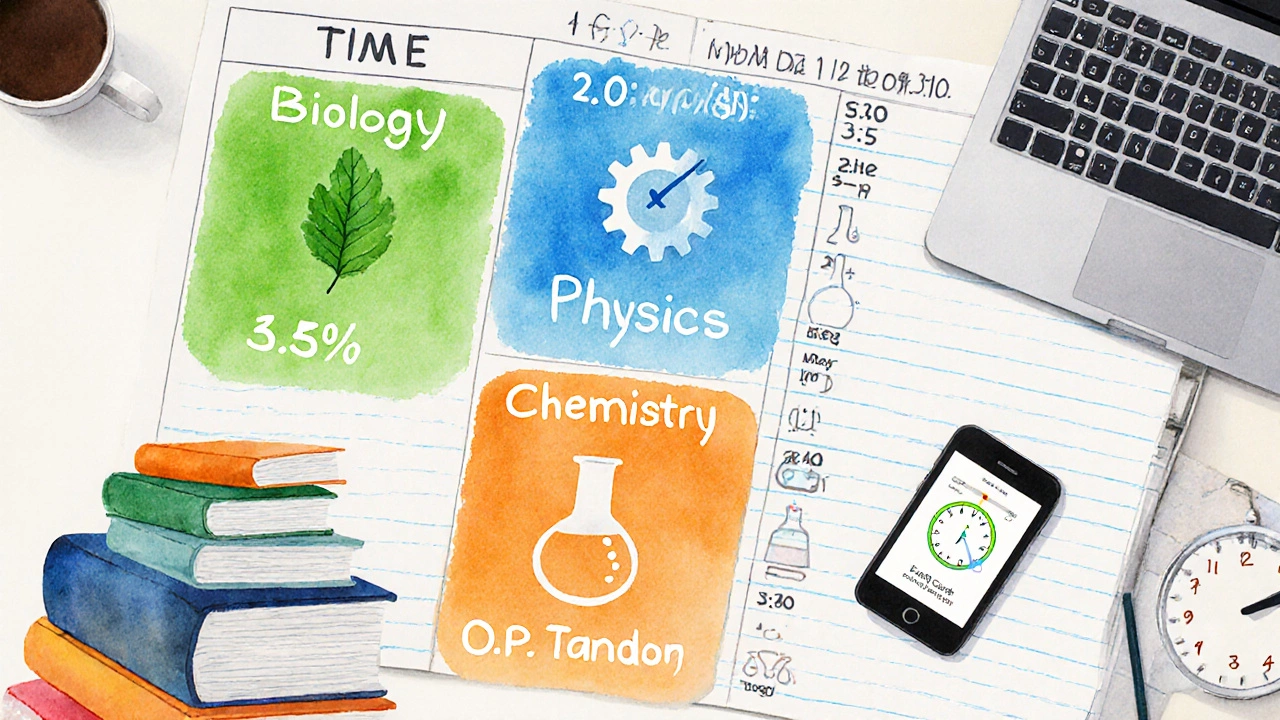NEET Subject Importance Calculator
Your Subject Impact Analysis
Biology
42% of total score
120 marks
Physics
28% of total score
80 marks
Chemistry
30% of total score
85 marks
When you ask yourself "Which class is most important for NEET?" you’re really hunting for the subject that will give you the biggest score boost. The answer isn’t a magic shortcut, but a clear look at how the NEET is India’s national medical entrance test that evaluates students on Physics, Chemistry and Biology is scored.
Understanding NEET’s Score Distribution
NEET consists of 180 multiple‑choice questions - 45 each from Physics, Chemistry and Biology (Botany+Zoology). Each correct answer fetches 4 marks, no negative marking for wrong attempts. That means the maximum marks per subject is 180, and the total exam carries 720 marks.
Because the total marks are evenly split, you might think every class is equally important. In reality, the weight each class carries in the final rank hinges on two things:
- Average scoring trends for each subject across the nation.
- How often high‑scorers leverage one subject to compensate for weaker areas.
Data from the 2024 NEET result analysis (released by the NTA) shows the following average scores:
| Subject | Average Marks | Percentage of Total Score |
|---|---|---|
| Biology (Botany + Zoology) | 120 | 41.7% |
| Physics | 80 | 27.8% |
| Chemistry | 85 | 30.5% |
The numbers make it clear: Biology typically yields the highest average marks, accounting for nearly 42% of the total score.
Why Biology Often Gets the Spotlight
Biology is the only subject where you can score a perfect 180 marks even with a relatively modest preparation level. The reason? The exam’s design focuses heavily on factual recall and diagram‑based questions that students encounter regularly in school labs.
In the CBSE syllabus for class 12, Biology covers 66 chapters split between Botany and Zoology., many topics repeat year after year - human anatomy, genetics, plant physiology, and ecology are staple sections. Mastering the core concepts in these chapters can net you 90‑plus marks without a massive time investment.
Because of this high ceiling, top NEET rankers routinely use Biology as their safety net while they push the limits in Physics and Chemistry.
The Real Role of Physics and Chemistry
Don’t let the lower averages fool you into neglecting Physics and Chemistry. Both subjects are where the competition sharpens, and a strong performance can catapult you into the 99‑percentile.
Physics questions test problem‑solving speed and conceptual clarity. Topics like Mechanics, Electrostatics, and Modern Physics often appear with a twist that separates the well‑practiced from the truly prepared.
Chemistry is split into Physical, Organic and Inorganic sections. While the latter two are memory‑heavy, Physical Chemistry demands numerical fluency. A student who nails concepts like Chemical Equilibrium or Thermodynamics can gain 30‑plus marks that compensate for a modest Biology score.
In short, Physics and Chemistry are the differentiators for high‑rank aspirants.

Smart Study Allocation: How to Divide Your Hours
Here’s a practical weekly plan based on a 6‑hour daily study window (typical for a 12th‑grade student balancing school).
- Biology - 35% (about 2.1hours): Focus on revising core chapters, drawing diagrams, and solving previous‑year MCQs.
- Physics - 30% (about 1.8hours): Alternate between theory review (30min) and problem practice (1.5hours). Use timed mock tests to build speed.
- Chemistry - 35% (about 2.1hours): Split the time: 1hour for Organic reactions & mechanisms, 45min for Physical equations, 30min for Inorganic facts, and 15min for quick recall flashcards.
Adjust the percentages if you’re already strong in one area. The key is to keep the total weekly hours consistent while rotating focus every two weeks to avoid burnout.
High‑Impact Topics to Master in Each Class
Targeting the right chapters gives you the biggest ROI.
- Biology:
- Human Physiology - circulatory, respiratory, nervous systems.
- Genetics - Mendelian laws, DNA replication, biotechnology.
- Plant Anatomy - transport, photosynthesis, growth hormones.
- Ecology - ecosystems, biodiversity, environmental issues.
- Physics:
- Mechanics - kinematics, Newton’s laws, work‑energy.
- Electricity & Magnetism - circuits, electromagnetic induction.
- Modern Physics - photoelectric effect, atomic models.
- Thermodynamics - laws, heat engines, entropy.
- Chemistry:
- Organic - functional groups, reaction mechanisms, stereochemistry.
- Physical - mole concept, chemical equilibrium, thermochemistry.
- Inorganic - periodic trends, coordination compounds, p‑block elements.
Spend extra revision time on the topics that appear in more than 25% of the previous year’s papers.
Resources and Tools for Efficient Prep
Choosing the right material can shave hours off your study schedule.
- Books: "NCERT Biology (Class 11‑12)" for fundamentals, "Objective Physics" by D.C. Pandey for problem sets, and "Organic Chemistry" by O.P. Tandon for reaction mastery.
- Online Platforms: BYJU’S offers video lessons aligned with the NEET syllabus, Unacademy provides live doubt‑clearing sessions with top NEET mentors, and KopyKitab has a massive repository of past year papers and mock tests.
- Apps: "NEET Prep" for quick MCQ drills, "Anki" for spaced‑repetition flashcards, and "Mathway" for instant physics calculations.
- Coaching: If you prefer classroom guidance, look for institutes that report a success rate above 30% in the last three years - for example, "Aakash Institute" or "Resonance".
Combine at least one high‑quality book with an interactive online platform; the mix of static reading and dynamic practice yields the best retention.

Common Misconceptions and Pitfalls
Many students fall into these traps:
- "Biology alone will guarantee a 90th‑percentile rank." - True only if you score near‑perfect marks in the other two subjects as well.
- "Skipping Physics problems saves time." - Problem‑solving speed is built through repeated practice; avoiding it hurts more.
- "Memorizing reactions is enough for Chemistry." - Understanding reaction conditions and energy changes is crucial for higher‑order questions.
Stay aware of these myths and keep a balanced preparation strategy.
Putting It All Together: Your Action Plan
1. Assess your baseline: Take a full‑length mock test and note scores per subject.
2. Identify gaps: If Biology is already strong (>110 marks), allocate extra hours to Physics and Chemistry.
3. Follow the weekly schedule: Stick to the 35‑30‑35 split, tweaking based on mock results.
4. Target high‑impact chapters: Use the list above to prioritize.
5. Review weekly: Solve at least 20 NCERT‑based MCQs per subject every weekend.
6. Simulate exam conditions: Every two weeks, attempt a timed mock that mimics the real NEET exam layout.
Following this roadmap will give you a clear picture of which class truly drives your NEET rank and how to leverage it.
Frequently Asked Questions
Is Biology the most important subject for NEET?
Biology contributes the largest share of total marks (about 42%). A solid Biology score can act as a safety net, but high ranks usually require strong Physics and Chemistry as well.
How many hours should I study each subject per week?
A balanced 6‑hour daily routine works well: ~35% of time for Biology, 30% for Physics, and 35% for Chemistry. Adjust the split based on your mock test performance.
What are the highest‑scoring topics in Physics?
Mechanics (especially kinematics and work‑energy), Electricity & Magnetism (circuits, magnetic fields), and Modern Physics (photoelectric effect) appear most frequently and carry higher marks.
Can I rely solely on NCERT books for NEET preparation?
NCERT books form the foundation and cover almost all exam concepts, but supplementing them with reference books, MCQ banks, and online video lessons boosts problem‑solving speed and depth.
How often should I take mock tests?
Aim for a full‑length mock every two weeks. In the final month before the exam, increase frequency to one mock per week to fine‑tune timing and stamina.
